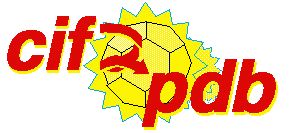![[IUCr Home Page]](.logos/iucrhome.jpg)
![[CIF Home Page]](.logos/cifhome.jpg)
![[ciftbx home]](.logos/ciftbxButton.jpg)
![[IUCr Home Page]](.logos/iucrhome.jpg)
![[CIF Home Page]](.logos/cifhome.jpg)
![[ciftbx home]](.logos/ciftbxButton.jpg)
|
<<<==== ENTER PDB ID CODE HERE |

for a discussion of the WPDB (Wide Protein Data Bank) format, see biomol.dowling.edu/WPDB
Work on the WPDB format supported in part by the U.S. Department of Energy under award ER63601-1021466-0009501.
cif2pdb is free software; you can redistribute this software and/or modify this software under the terms of the GNU General Public License as published by the Free Software Foundation; either version 2 of the License, or (at your option) any later version.
This software is distributed in the hope that it will be useful, but WITHOUT ANY WARRANTY; without even the implied warranty of MERCHANTABILITY or FITNESS FOR A PARTICULAR PURPOSE. See the GNU General Public License for more details.
You should have received a copy of the GNU General Public License along with this software; if not, write to the Free Software Foundation, Inc., 59 Temple Place, Suite 330, Boston, MA 02111-1307 USA


This program is available as a compressed shar cif2pdb.shar.Z (3 megabytes), a compressed C-shell shar cif2pdb.cshar.Z (3 megabytes) or as individual files, as given in the MANIFEST.
If your system cannot handle a Unix-style compressed file, you may wish to download an uncompressed shar cif2pdb.shar or an uncompressed cshar cif2pdb.cshar.
This program is version 2.0.3 of cif2pdb, capable of doing a conversion of an mmCIF data set to a partial pseudo-PDB entry with HEADER, TITLE, COMPND, SOURCE, KEYWRD, AUTHOR, JRNL, REMARK 1, REMARK 960, SEQRES, CRYST1, ORIGX, SCALE, ATOM, SIGATM, ANISOU, SIGUIJ (starting with U's or B's), HETATM, MASTER and END records. Fractional or orthogonal coordinates may be provided in the mmCIF data set. If an mmCIF dictionary or other dictionary with the necessary aliases between mmCIF and the core is provided, the program can convert core CIF data sets. This is sufficient to drive RASMOL. With version 2, the alternative of using WPDB format for output is provided, flagged by use of the -w option on the command line and in the output by the LEADER record in place of a HEADER record.
Comments to yaya@bernstein-plus-sons.com appreciated.
***** This directory contain files with the suffix ".pdb" Those files were produced by cif2pdb and are _not_ PDB entries.
cif2pdb [-i input_cif] [-o output_entry] [-d dictionary]
[-p pdb_entry_id] [-f command_file] [-t u|l|p]
[-w yes|no] [-m string_in_cif string_in_pdb]
[[[input_cif] [[output_entry] [dictionary]]]
input_cif defaults to $CIF2PDB_INPUT_CIF or stdin
output_cif defaults to $CIF2PDB_OUTPUT_ENTRY or stdout
dictionary defaults to $CIF2PDB_CHECK_DICTIONARY
multiple dictionaries may be specified
input_cif of "-" is stdin, output_entry of "-" is stdout
-t has values of u for upper case, l for upper/lower,
p for PDB typesetting codes, (default -t l)
-w has the values yes or no (default -w no)
There are strong assumptions in the build of cif2pdb about the directory structure. cif2pdb is a ciftbx application. It is assumed that cif2pdb.src is inserted in the ciftbx directory tree at the same level as ciftbx.src In order to avoid clobbering a prior version before you know this release of cif2pdb is working correctly in your system, you should save a copy of the current cif2pdb.src directory before unpacking this package.
The resulting directory structure should be
top level directory
-------------------
|
----------------------------------
| | |
cif2pdb.src ciftbx.src dictionaries
----------- ---------- ------------
In order to compile you will need a copy of ciftbx. In order to recreate the test output you will need a copy of the an appropriate mmCIF dictionary. Compilation is controlled by Makefile, which may need changes for the target system. Changes can be made by editing Makefile, if necessary, but in most cases it is easier to edit the m4 document, Makefile.m4, and then
make Makefile_local
which will replace the current Makefile. Then cif2pdb can be compiled and tested by
make cif2pdb
make tests
Release 2.0.3 adpated cif2pdb to the changes in CIFtbx for release CIFtbx 4.1.0
Release 2.0.2 incorporated improvements to the Makefile by G. Todorov to add a "make disclean" clause, correct an error in the definition of MMDICPATH, and add the entry for cif_mm_pdb2cif.dic to the dictionaries directory. The "make tests" clause was updated to include a timer. In order to improve timing, a counted string version of splitstr called csplitstr was created. instead of
Release 2.0.1 added support for WPDB format, corrected errors in the creation of REMARK 960 (and changed REMARK 960 to REMARK 9600 for the wide format), added the code for TITLE, SEQRES, FTNOTE and to handle anisotropic temperature factors from a separate loop. The changes for WPDB format include increases in the line length for the input CIFS to 2048 characters.
Release 1.0.2 corrected a error in the forming REF fields that caused some field to be truncated. Our thanks to Vince Stanev for isolating the problem. The duplicate upcase function was removed, since it is now in ciftbx.
Release 1.0.1 corrected the spelling of _atom_sites.fract_transf_matrix... and improved the handling of category keys.
For further information contact Herbert Bernstein